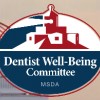
The Dentist Well-Being Committee is a standing committee of the Maryland State Dental Association. The Committee assists dentists and their families who may be experiencing personal problems. The Committee has helped many dentists over the years with problems such as stress, drug dependence, alcoholism, depression, medical problems, infectious diseases, neurological disorders and other illnesses that cause impairment.
This short video gives you an overview of the Dentist Well-Being Committee and how it helps dentists and their families with personal problems. See dentist resources for more videos. The Committee provides a confidential, non-disciplinary avenue for dentists to seek appropriate help for problems. Referrals are completely confidential. Any dentist who seeks help as a self-referral can be assured that their information will be held in the strictest confidence.
The Board of Regents Faculty Award represents the highest honor bestowed by the board to exemplary faculty members from USM institutions.
This short video gives you an overview of the Dentist Well-Being Committee and how it helps dentists and their families with personal problems. See dentist resources for more videos. The Committee provides a confidential, non-disciplinary avenue for dentists to seek appropriate help for problems. Referrals are completely confidential. Any dentist who seeks help as a self-referral can be assured that their information will be held in the strictest confidence.
The Board of Regents Faculty Award represents the highest honor bestowed by the board to exemplary faculty members from USM institutions.
Services
How is a Dentist Referred?
Family members, employees, associates or friends concerned about a dentist often contact the Dentist Well-Being Committee.
Many dentists are self-referred.
Is the Process Punitive?
No.
The Dentist Well-Being Committee acts as an advocate for the dentist with the State Board of Dental Examiners, insurance companies and law enforcement agencies as long as the dentist is compliant with treatment.
What Happens After a Referral?
The Committee first determines if the dentist actually has a problem.
Family members, employees, associates or friends concerned about a dentist often contact the Dentist Well-Being Committee.
Many dentists are self-referred.
Is the Process Punitive?
No.
The Dentist Well-Being Committee acts as an advocate for the dentist with the State Board of Dental Examiners, insurance companies and law enforcement agencies as long as the dentist is compliant with treatment.
What Happens After a Referral?
The Committee first determines if the dentist actually has a problem.
The Dental Support Group is a support group for dentists in recovery and invited guests.
It is run the same way as an AA meeting, however, we encourage members to talk about drugs other than alcohol.
This is a forum for dentists to share problems and concerns affecting their professional and personal lives.
We encourage the members of this group to seek the fellowships of AA, NA, or mental health groups, and for newcomers we stress the importance of attending ninety meetings in the first ninety days of recovery.
It is run the same way as an AA meeting, however, we encourage members to talk about drugs other than alcohol.
This is a forum for dentists to share problems and concerns affecting their professional and personal lives.
We encourage the members of this group to seek the fellowships of AA, NA, or mental health groups, and for newcomers we stress the importance of attending ninety meetings in the first ninety days of recovery.
What is the Dental Hygiene Well-Being Committee?
It is a committee of the Maryland Dental Hygienists' Association.
It is a confidential service available to provide well-being assistance to any licensed dental hygienist, dental radiation technologist or dental assistant in the state of Maryland who is dealing with a physical, emotional, mental or substance abuse difficulty.
Individuals may be self-referred, referred by family, colleagues or employers, or referred by the Maryland State Board of Dental Examiners.
It is a committee of the Maryland Dental Hygienists' Association.
It is a confidential service available to provide well-being assistance to any licensed dental hygienist, dental radiation technologist or dental assistant in the state of Maryland who is dealing with a physical, emotional, mental or substance abuse difficulty.
Individuals may be self-referred, referred by family, colleagues or employers, or referred by the Maryland State Board of Dental Examiners.
Have you been feeling sad, unmotivated, or are you having problems concentrating and getting things done?
You may be dealing with depression.
The National Mental Health Association has a helpful website called Depression Screening, describing the symptoms of depression and its treatment.
There is also a free and confidential depression screening test.
Stress is our body's physical, mental, and chemical way of reacting to situations that frighten, excite, confuse, endanger or irritate you.
Stress prepares you to handle things that you are unfamiliar with, or things that appear to threaten you.
You may be dealing with depression.
The National Mental Health Association has a helpful website called Depression Screening, describing the symptoms of depression and its treatment.
There is also a free and confidential depression screening test.
Stress is our body's physical, mental, and chemical way of reacting to situations that frighten, excite, confuse, endanger or irritate you.
Stress prepares you to handle things that you are unfamiliar with, or things that appear to threaten you.
Start Your Recovery is a free, confidential tool that helps individuals take steps toward a healthy relationship with drugs and alcohol.
It was developed with the input of leading clinicians, experts from leading organizations like SAMHSA, and people in recovery themselves.
Start Your Recovery helps people deal with substance use issues and find support.
Suicide Prevention (a resource guide on emergency assistance, warning signs & prevention of suicide in college students).
A guide to maintaining sobriety while receiving treatement for other health problems.
It was developed with the input of leading clinicians, experts from leading organizations like SAMHSA, and people in recovery themselves.
Start Your Recovery helps people deal with substance use issues and find support.
Suicide Prevention (a resource guide on emergency assistance, warning signs & prevention of suicide in college students).
A guide to maintaining sobriety while receiving treatement for other health problems.
Reviews

Be the first to review Msda Dentist Well Being Committee.
Write a Review




